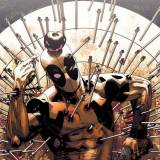Bioshock Infinite ramblings. *spoilers*
By WiqidBritt 0 Comments
I really hope this doesn't end up sounding like an "everyone else is wrong but me" kind of rant. One of the great things about stories are how they can mean different things to different people and can be interpreted in many different (maybe even 'Infinite' eh? eh?) ways. But listening to the 'Best Story' segment of the GOTY bombcast had me ranting in my head so much that I had to stop the podcast and get these thoughts out.
Also, super mega spoiler warnings.
I feel like looking at the ending of Bioshock Infinite as a classic sci-fi take on the many-worlds interpretation of quantum mechanics is not the right idea. It has a basis in that theory, yes, and there are a pair of super smart science types that lend it credence, but the way the revelation is presented in the end heavily leans in a different direction than just science. It's not about multiple universes, or at least not complete universes. It's about the power of storytelling. Thinking about this in a scientific manner only puts the focus on the wrong elements. It's not important to think about the mechanics of how everything works and trying to make sense of these things in a way that would work in the world that we know. That's not the point. The Sea of Doors at the end of the game obviously (to me) isn't meant to be a representation of a real multiverse. We're not meant to think that one of those doors leads into our own world. The way Elizabeth says "there's always a lighthouse, always a man, always a city," implies something very specific about what you're seeing. It's not about infinite quantum universes. It's about the infinite possibilities that a doorway presents to a storyteller.
These are not complete universes. As richly detailed as Rapture and Colombia are themselves, the rest of the world might as well not exist except as an entity to be turned away from and/or destroyed by a driven and deeply ideological individual. It's a story, not a universe. And that's fine. Stories know they're not perfect, they're meant to serve a purpose. (Here, it's to show that an unwavering devotion to flawed ideals rarely turn out well, even if the initial ideas might have had some merit to them.) To try and think of these stories as complete, logical and scientifically sound universes is to judge them by the wrong criteria. Focusing on whether or not the game justifies pulling back the curtain or makes sense of how all of these different story worlds interconnect detracts from what the story is actually about. How absolution given freely without a change in personal character can lead bad things. And that brutal oppression of a group of people often leads to an even more brutal and destructive revolution and how idealism and reality very rarely line up in the ways one would hope.
Simplistic? Over exaggerated? Yes, but stories often are when they want to make a point. For Jeff to compare this to Michael Bay-esque mindless blockbusters is kind of insulting. This game has things to say. Even if the morals are presented fairly bluntly (there's no question that Comstock is a bad guy that needs to be stopped, Daisy has slightly more grey area but still has clearly gone too far) it still presents other interesting ideas about various themes including the American Ideal (the fact that a very right wing group posted some art from the game on its facebook page unironically, indicates that maybe the game isn't quite as exaggerated as we might hope). Claiming that the game is little more than an empty rollercoaster ride that saves the most wild twists and turns for the last 20 minutes is perhaps being a little short sighted and too quick to write something off as nonsense just because it isn't immediately clear what it is they're getting at.
